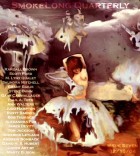When he enters the gym the ballers he’d played with and against since grade school, fans who’d borne witness, point him out (“Train’s in the house.”). Like a neighborhood watch group, they make sure he gets to his courtside seat.
He’s taken his hat off, feels the zigzaggety scar in the back of his head, the two thumbtack sized ones where the surgeons drilled, as if to see if they’re still there. He replaces his hat and hugs himself like a kid who’s mindful of keeping his hands off others, rocks himself safe-room secure, his alive switch thrown by the sounds of sneakers screeching birdlike as the hoopers wearing them try to gain, deny, position. This is the part of the film of his life that he’s able to restore, where he’s able to insert a piece of his past self, yet he knows that without warning, the projectionist could walk out, leave him watching a blank screen, and he’ll have no idea of who he is, where he is, how he got there.
He especially watches “the point,” his old job, like a self-appointed guardian/commissioner/historian. As if the state of the game depended on this one position. It does. This game is about creases, always was, always will be, and it’s the point guard, like a gambler looking for a “tell,” who initiates the search. Not an easy job when someone’s trying to steal the basketball from you. If you can’t see a crease you have to create one, bodying to spin, spinning to body, bumping, sliding, clearing space, creating a better angle, and once seeing it, even in a crosswalk of clashing pedestrians, penetrating it. Becausethinkaboutitandit’sgone.
On defense you the thief.
Train still sees creases. He shouts their addresses to point guards who exploit them more for themselves than teammates. But a quarter has to slide down a slot before Train’s words, like songs on a jukebox, can come out. By that time the addresses have vanished, the ball’s changed possession, what Train’s said an oldie. And even then the words are stretched, like the truth in a liar’s mouth, weighted, as if dunked in wet cement.
He sits hunched forward on the wood. His hands feel his scarred head again. Those hands. Big, strong, ball hawking hands. He amazes his doctors with those hands. His brain’s wiring had no beef with his hands. A while back he snatched a ballpoint pen out of mid-air that one of them had dropped. Did it again to prove he could do it again. He’s like a museum burned to the ground except for the paintings.
He remembered the fall, when it happened, telling himself: I’ve hit my head before. I’ll sit out, put some ice on it and go back in.
But he can’t get up.
It seems some Samoan guys are sitting on top of him and they won’t get off—until the ambulance arrives.
The sound of the time-out buzzer leaves him feeling like wasps are trying to escape from inside his ears. A traffic light is blinking inside his forehead. If he’s not careful here comes a migraine. The projectionist will leave too. It’ll be as if he’s thrown sleeping from his bed and the weighted words he calls for help with will only mock him. He calms himself, thinking: When the game is over, I will meet Ray out front. When the game is over I will meet Ray out front…
Ray will drive him back to the house he lives in with the other “head cases.” He’ll eat a snack, watch television, go to bed, dream of playing the point again.
His ordeal passes. He wipes sweat from his cold face and concentrates on the game. The home team point guard, double-teamed, ignores an open teammate and goes up the left sideline. Train is so upset at this violation that he holds onto his hat as if a hurricane might blow it off and points out the so obviously open teammate. But the point guard ignores him. He’s so intent on doing it all himself that he’s passed Train before he or the defenders realizes the basketball’s not his anymore. Train has picked him.
The crowd, urging a comeback only seconds ago, sucks its breath, goes silent. Not one whistle blows.
Train gets himself to his feet and steps onto the court. He holds the basketball in those two big hands and he demonstrates for the point guard’s benefit a chest pass to the open teammate. “Pass the ball, man!” he tells the point guard, as for the good of all. The words come out of his mouth thick but clear, and with a weightlessness.


 The core workshop of SmokeLong Fitness is all in writing, so you can take part from anywhere at anytime. We are excited about creating a supportive, consistent and structured environment for flash writers to work on their craft in a community. We are thrilled and proud to say that our workshop participants have won, placed, or been listed in every major flash competition. Community works.
The core workshop of SmokeLong Fitness is all in writing, so you can take part from anywhere at anytime. We are excited about creating a supportive, consistent and structured environment for flash writers to work on their craft in a community. We are thrilled and proud to say that our workshop participants have won, placed, or been listed in every major flash competition. Community works.